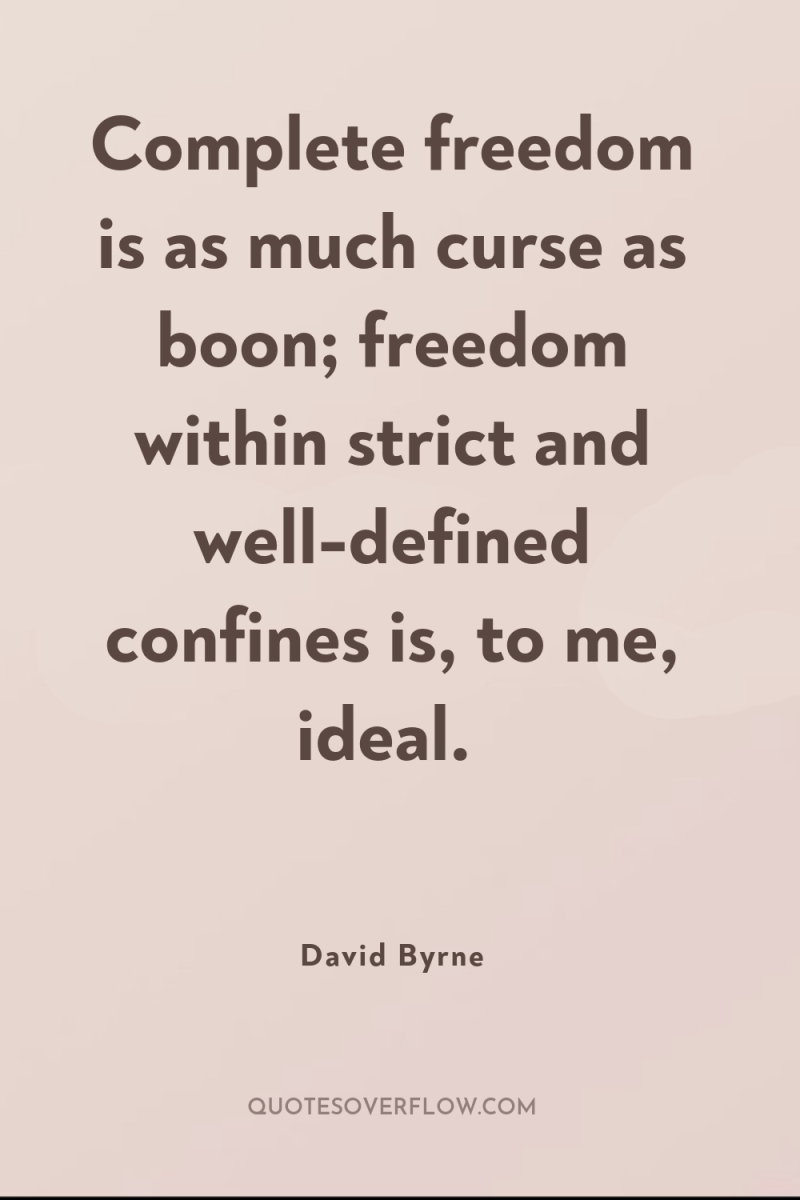
1
Complete freedom is as much curse as boon; freedom within strict and well-defined confines is, to me, ideal.David Byrne
2
In musical performances one can sense that the person on stage is having a good time even if they're singing a song about breaking up or being in a bad way. For an actor this would be anathema, it would destroy the illusion, but with singing one can have it both ways. As a singer, you can be transparent and reveal yourself on stage, in that moment, and at the same time be the person whose story is being told in the song. Not too many kinds of performance allow that. .David Byrne
3
I like a good story and I also like staring at the sea-- do I have to choose between the two?David Byrne
4
You might say that the universe plays the blues.David Byrne
5
Presuming that there is such a thing as "progress" when it comes to music, and that music is "better" now than it used to be, is typical of the high self-regard of those who live in the present. It is a myth. Creativity doesn't "improve.David Byrne
6
In the early days, I might have gotten on stage and begun to sing as a desperate attempt to communicate, but now I found that singing was both a physical and emotional joy. It was sensuous, a pure pleasure, which didn't take away from the emotions being expressed–even if they were melancholic. Music can do that; you can enjoy singing about something sad.David Byrne
7
Recordings aren't time sensitive. You can hear the music you want whether it's morning, noon, or the middle of the night. You can "get into" clubs virtually, "sit" in concert halls you can't afford to visit, go to places that are too far away, or hear people sing about things you don't understand, about lives that are alien, sad, or wonderful. Recorded music can be ripped free from its context, for better and worse. It becomes its own context.David Byrne
8
The mixtapes we made for ourselves were musical mirrors. The sadness, anger, or frustration you might be feeling at a given time could be encapsulated in the song selection. You made mixtapes that corresponded to emotional states, and they'd be avaliable to pop into the deck when each feeling needed reinforcing or soothing. The mixtape was your friend, your psychiatrist, and your solace.David Byrne
9
The online music magazine Pitchfork once wrote that I would collaborate with anyone for a bag of Doritos.David Byrne
10
Music written by teams makes the authorship of a piece indistinct. Could it be that when hearing a song written by a team, a listener can sense that they aren't hearing an expression of a solitary individual's pain or joy, but that of a virtual conjoined person? Can we tell that an individual singer might actually represent a collective, that he might have multiple identities? Does that make the sentiments expressed more poetically universal? Dan eliminating some portion of the authorial voice make a piece of music more accessible and the singer more empathetic? .David Byrne
11
Any kid will tell you that, yes, their music is both an escape and a survival mechanism, and that sometimes the music givesbthem hope and inspiration. It doesn't just placate and pacify.David Byrne
12
There are two conversations going on at the same time: the story and a conversation about how the story is being told.David Byrne
13
Everyone was doing that in their own way, rejecting things and moving on. It's just a part of discovering who you are; it's nothing special.David Byrne
14
There's a good chance that you might be inspired by ideas that originate outside of yourself.David Byrne
15
One forgets that part of one's performance is one's history–or sometimes the lack of it. You're playing against what an audience knows, what they expect. This seems to be true of all performers; there's baggage that gets carried into the venue that we can't see.David Byrne
16
The radio was shouting at you, pleading with you, and seducing you.David Byrne
17
But at times words can be a dangerous addition to music – they can pin it down. Words imply that the music is about what the words say, literally, and nothing more. If done poorly, they can destroy the pleasant ambiguity that constitutes much of the reason we love music. That ambiguity allows listeners to psychologically tailor a song to suit their needs, sensibilities, and situations, but words can limit that, too. There are plenty of beautiful tracks that I can’t listen to because they’ve been “ruined” by bad words – my own and others. In Beyonce's song "Irreplaceable, " she rhymes "minute" with "minute, " and I cringe every time I hear it (partly because by that point I'm singing along). On my own song "Astronaut, " I wrap up with the line "feel like I'm an astronaut, " which seems like the dumbest metaphor for alienation ever. Ugh.David Byrne
18
I also realized that there were lots of unacknowledged theater forms going on all around. Our lives are filled with performances that have been so woven into our daily routine that the artificial and performative aspect has slipped into invisibility.David Byrne
19
Powerpoint presentations are a kind of theater, a kind of augmented stand-up. Too often it's a boring and tedious genre, and audiences are subjected to the bad as well as the good.David Byrne